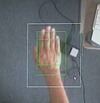IGERT Program, Goals, and Themes
| Education | ||
Education
Our IGERT program is a model for graduate education in the multidisciplinary area of interactive digital multimedia. Participating doctorate students have opportunities for collaborative research, a range of courses and seminars, internships in industry, experience in management and entrepreneurship, and training in ethics and career management, all in an environment that transcends traditional departmental boundaries. The broad backgrounds of students and faculty from Electrical Engineering, Computer Science, Media Arts and Technology, Psychology, and Geography create a diverse, unique mix, engendering a visible community of participants at UCSB. Consider the following examples:
As part of their education, we require our trainees
to participate in substantial, interdisciplinary group projects.
Trainees gain experience in group dynamics, leadership development,
and multidisciplinary research. Many of these projects continue
from year to year, often with new, more complex research directions.
Some projects spin-off into other research efforts, with participation
from students who are not directly under the IGERT umbrella. This
is a significant educational achievement as our training trickles
down to masters and doctoral students in other departments and programs.
One example is our Spheres of Influence library installation which
has now gone through three distinct versions and spawned research
in video segmentation, digital media education, human computer interaction,
data mining, geospatial databases, and the visual/spatial arts.
|
  
Pictures courtesy of Keith Clarke, Project Battuta |
Interactive Digital Multimedia
IGERT
University of California
Santa Barbara, CA 93106-9560
Tel: (805) 893-5913
Fax: (805) 893-3262
info-igertATmediaDOTigertDOTucsbDOTedu